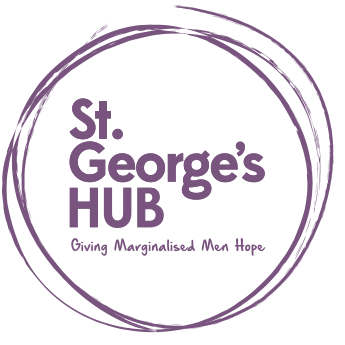About

About
About
St. George’s House Charity was founded in 1950 to support the most disadvantaged people in our community. It first registered with the Charity Commission for England and Wales on 26th January 1973 and re-registered 24th November 1998, when it became a company limited by guarantee.
Uniquely at St. George’s HUB we work with the regions most vulnerable and marginalised men; targeting the issues where clients have disproportionately worse outcomes and life chances, such as rough sleeping, health, substance misuse, offending behaviour and suicide.
St. George’s HUB is a safe space to address their problems, developing confidence and self-esteem as well as raising aspirations. We also seek to change the perceptions society has of these men and the perception these men have of society.
Addressing Rough Sleeping
SGH has been tackling Rough Sleeping in Wolverhampton since the 1950’s. We are known for our work vulnerable and excluded men often in a state of crisis. SGH went back to its roots in 2017 to focus on homeless, vulnerable and excluded men.
In the DLHUC Rough sleeping snapshot in England in autumn 2022, most people sleeping rough on a single night in autumn were male. In 2022, there were 2,539 men (83% of the total) and 464 women (15% of the total) sleeping rough on a single night in autumn.
In Wolverhampton, a huge majority are rough sleepers are men. Though much has changed since the 1950’s working with rough sleepers and preventing homelessness remains our core priority.
SGH Staff join the city outreach team regularly, supporting people sleeping rough to escape life on the streets. Our priority is to get people into safe accommodation. Our Breakfast club also offers a highly effective means of engaging with rough sleepers.
Men who have slept rough might find it hard to trust others because of negative experiences. Our staff build up trust and get to know the men individually. Working together with the men we support; we find the best route out of homelessness and towards recovery for them.
We also work in partnership and liaise with other organisations to help people access accommodation and support, like physical and mental health services, drug and alcohol services, and legal services. At SGH we have staff and volunteers who speak different languages to overcome barriers, get to know and support men needing help.
For anyone facing homelessness, and particularly for people who are sleeping rough, our first priority is to make sure that they have somewhere safe and secure to sleep.
What can “Homelessness” mean?
Sleeping Rough
Sleeping rough is when someone is sleeping on the streets. It is the most visible form of homelessness.
Being Homeless
Being homeless is not necessarily sleeping rough, but being in unstable accommodation such as a hostel, B&B, or another type of temporary home.
Sofa Surfing
Sofa surfing is moving between friends’ or relatives’ houses. It can also be known as “hidden homelessness.”
Causes of homelessness
While each person’s story is unique, there are many reasons that can contribute to why people find themselves facing homelessness. This can be a result of individual circumstances, a relationship breakdown, bereavement, or mental health issues which can be exacerbated by wider social and economic factors. Homelessness is complex but could happen to any of us. Rough sleeping is not acceptable in a civilised country in 2023; we are determined to remove the spectre of homelessness permanently.
That’s just the beginning
Getting someone off the streets is a vital first step towards a person’s recovery, but it’s not the end of the story. At SGH, by using the Outcome’s Star, and applying the Cycle of Change, drawing on a person’s unique skills and strengths places them at the heart of their own recovery.
Preventing Homelessness
While sleeping rough is the most visible form of homelessness, the causes and consequences of having nowhere stable to live are often much more complicated. That’s why we focus on addressing the issues holistically, a person faces, to help them move on with their lives.
Men experiencing homelessness often face several issues, commonly involving feelings of isolation, mental health problems, and drug or alcohol use. We know that working with people to understand their goals, and then helping them to achieve those is the best way to overcome these issues.
Time and again we’ve shown that the men we see can, and do, overcome the problems that caused them to become homeless. This is truly inspiring. SGH believes passionately that with time, understanding and with support, we can help everyone into a stable tenancy to call home, so they can live independent lives and fulfil their hopes, ambitions and dreams. By offering proactive housing options and advice, working with housing providers, private landlords and the local authority to find solutions to ensure tenancies are secured and sustained. SGH provides security and stability to the most vulnerable men in Wolverhampton.
Our Team
St. George’s HUB, Wolverhampton is led by Chief Executive Officer, Fazia Bano. The day to day responsibility for managing the organisation’s activity is delegated to the CEO who is accountable to the Trustees. We currently employ 5 staff who provide a vital contribution to all the services we offer.
St. George’s HUB, Wolverhampton is governed by a Board of Trustees who are volunteers from a diverse range of backgrounds.
The Board of Trustees currently consists of 8 members who commit their skills and experiences towards the development of the organisation. They ensure governance is maintained to an exceptional high standard.
Chief Executive
Fazia Bano
Board of Trustees Members
Chair of the Board
Richard Ashwell
Treasurer of the Board
Sheila Sockett
Other Members
Chris Horton
Thomas Mountford
Lalita Patel
Lesley Williams
Your time helping can change lives


